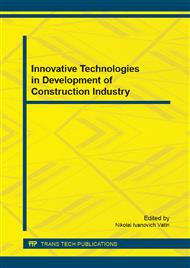[1]
Kosanović, S., Arsić, N. A study of energy efficiency within the model for environmental assessment of buildings (2014) GNP 2014, pp.1617-1624.
Google Scholar
[2]
United Nations Economic Commission for Europe: Green Homes - Towards energy efficient housing in the United Nations Economic Commission for Europe Region. United Nations. New York and Geneva (2009).
DOI: 10.18356/f162873b-en
Google Scholar
[3]
Jovanović Popović, M., Kavran, J. Energy efficiency and renewal of residential building stock. Proceedings of the International conference with exhibition S. ARCH - Sustainable architecture (2014) Belgrade, pp.283-294.
Google Scholar
[4]
Amann, W., Kalezić, Đ. State Action plan of Montenegro for energy efficient measures in housing sector (2012) Project report 2012/001. United Nations Economic Commission for Europe (UNECE), Genève, 85 p.
Google Scholar
[5]
Kosanović, S. Jovanović Popović, M. Ecological assessment of building materials in Serbia: Constraints and possibilities (2014) International Journal of Contemporary Architecture The New ARCH, Vol. 1 (1), pp.51-58.
Google Scholar
[6]
Information from: http: /www. euroace. org/LinkClick. aspx?fileticket=SU86bEBWExk%3d&tabid=69.
Google Scholar
[7]
Nikčević, R. The Reference book on Energy Efficiency Legal Framework in European Union and in Montenegro. Bar, (2012), 71 p.
Google Scholar
[8]
Information from: http: /www. energy-community. org/pls/portal/docs/3356393. pdf.
Google Scholar
[9]
Republika Srbija, Ministarstvo životne sredine, rudarstva i prostornog planiranja: Pravilnik o energetskoj efikasnosti zgrada (Rulebook on energy efficiency of buildings). Službeni glasnik RS, br. 61/2011 (2011).
Google Scholar
[10]
Republika Srbija, Ministarstvo životne sredine, rudarstva i prostornog planiranja: Pravilnik o uslovima, sadržini i načinu izdavanja sertifikata o energetskim svojstvima zgrada(Rulebook on terms, content and ways of issuing the certificates of energy performance of buildings). Službeni glasnik RS, br. 61/2011 (2011).
Google Scholar
[11]
Crna Gora, Ministarstvo ekonomije uz saglasnost Ministarstva održivog razvoja i turizma: Pravilnik o minimalnim zahtjevima energetske efikasnosti zgrada (Rulebook on minimal requirements for energy efficiency of buildings). Službeni list Crne Gore, br. 23/13 (2013).
Google Scholar
[12]
Crna Gora, Ministarstvo ekonomije: Pravilnik o sertifikovanju energetskih karakteristika zgrada (Rulebook on certification of energy performance of buildings). Službeni list Crne Gore, br. 24/2013 (2013).
Google Scholar
[13]
Crna Gora, Ministarstvo ekonomije: Pravilnik o programu obuke za energetske preglede, sadržaju zahtjeva za izdavanje ovlašćenja i registra ovlašćenih lica (Rulebook on the training for energy audits , content of the application for authorization issuing and the register of authorized persons ). Službeni list Crne Gore, br. 24/2013 (2013).
Google Scholar
[14]
Jovanović Popović, M., Ignjatović, D. eds. National typology of residential buildings in Serbia. (2014) Faculty of Architecture of University of Belgrade and GIZ - Deutsche Gesellschaft für Internationale Zusammenarbeit, 253 p.
Google Scholar
[15]
Deda, P. Georgiadis, G. Tackling climate change - trends and challenges in enhancing energy efficiency in building in the ECE region (2009) ECE Annual Report 2009. ECE, Geneva, 132 p.
Google Scholar
[16]
Ćetković, J., Knežević, M., Žarković, M., Murgul, V., Vatin, N. Development and competitiveness improvement of the construction sector in Montenegro (2014) Applied Mechanics and Materials. Vol. 638-640, pp.2465-2470.
DOI: 10.4028/www.scientific.net/amm.638-640.2465
Google Scholar


